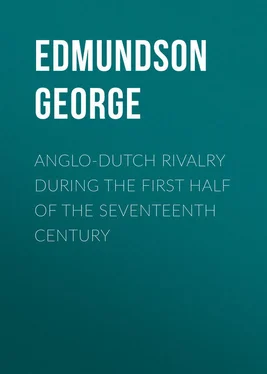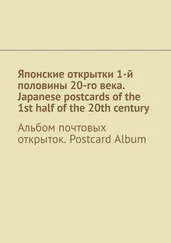George Edmundson - Anglo-Dutch Rivalry during the First Half of the Seventeenth Century
Здесь есть возможность читать онлайн «George Edmundson - Anglo-Dutch Rivalry during the First Half of the Seventeenth Century» — ознакомительный отрывок электронной книги совершенно бесплатно, а после прочтения отрывка купить полную версию. В некоторых случаях можно слушать аудио, скачать через торрент в формате fb2 и присутствует краткое содержание. Жанр: foreign_antique, foreign_prose, на английском языке. Описание произведения, (предисловие) а так же отзывы посетителей доступны на портале библиотеки ЛибКат.
- Название:Anglo-Dutch Rivalry during the First Half of the Seventeenth Century
- Автор:
- Жанр:
- Год:неизвестен
- ISBN:нет данных
- Рейтинг книги:4 / 5. Голосов: 1
-
Избранное:Добавить в избранное
- Отзывы:
-
Ваша оценка:
- 80
- 1
- 2
- 3
- 4
- 5
Anglo-Dutch Rivalry during the First Half of the Seventeenth Century: краткое содержание, описание и аннотация
Предлагаем к чтению аннотацию, описание, краткое содержание или предисловие (зависит от того, что написал сам автор книги «Anglo-Dutch Rivalry during the First Half of the Seventeenth Century»). Если вы не нашли необходимую информацию о книге — напишите в комментариях, мы постараемся отыскать её.
Anglo-Dutch Rivalry during the First Half of the Seventeenth Century — читать онлайн ознакомительный отрывок
Ниже представлен текст книги, разбитый по страницам. Система сохранения места последней прочитанной страницы, позволяет с удобством читать онлайн бесплатно книгу «Anglo-Dutch Rivalry during the First Half of the Seventeenth Century», без необходимости каждый раз заново искать на чём Вы остановились. Поставьте закладку, и сможете в любой момент перейти на страницу, на которой закончили чтение.
Интервал:
Закладка:
Another pamphlet, The Trades Increase 22 22 Ibid. iv, pp. 212-31.
, was of wider scope. It was directly inspired, as its anonymous author J. R. informs us, by the reading of England's Way to win Wealth . It deals not only with the question of the fisheries, but of shipping and trade generally, and rightly with shipping first of all. 'As concerning ships,' J. R. writes – and how true do his words ring in an Englishman's ears to-day – 'by these in a manner we live, the kingdom is, the King reigneth… If we want ships, we are dissolved.' As Gentleman's pamphlet is valuable for its detailed statistics of the fishing industry of the Hollanders, even more so is that of J. R. for its broad survey of and comparison between the Dutch and English trade in every part of the world. From country to country and sea to sea in all branches of commerce he shows how the English are being driven out by their more enterprising competitors.
'In consequence want of employment is breeding discontents and miseries, while the means for remedying threatened disaster are in our own hands, the place our own seas and within his Majesty's dominions.'
Nor is J. R. content with mere assertion. Basing his arguments on those of Gentleman, he proceeds to set forth how by the encouragement of English fishing
'we shall repair our Navy, breed seamen abundantly, enrich the subject, advance the King's custom, and assure the Kingdom, and all this out of fishing and especially out of herrings.'
As to the Hollanders, he remarks significantly: —
'Howsoever it pleaseth his Majesty to allow of his royal predecessor's bounty, in tolerating the neighbour nations to fish in his streams, yet other princes take more straight courses.'
This powerful and reasoned summary of a condition of affairs so threatening to England's supremacy as a maritime power, and to the welfare of her people, testifies to the mixture of indignation and alarm with which the English people regarded the rapid progress in commerce and wealth of 'their neighbours the new Sea-Herrs', as J. R. names the Dutch. If further evidence were wanting as to the state of feeling in the country, it is furnished by the striking language of the Venetian envoy, Pietro Contarini (1617/18). According to the report of this impartial observer 23 23 Relazioni Venete , Inghilterra , iv. 206.
: —
'Loud praises of past times and the worthy deeds of forefathers form the topic of conversation. I have heard great lords with tears of the deepest affliction lamenting the present state of things and grieving how England has already fallen in reputation with all the world, England whose name and whose forces were feared by foes and esteemed by friends. Now the memory of past glory lost, as it were fallen into forgetfulness of herself, she abandons not only the interests of others, but even her own.'
Such was the result of the forciful feeble policy of James, striving to pose as the keeper of the peace of Europe, and to hold the balance between the rival forces of Catholicism and Protestantism already arming for the terrible struggle of the Thirty Years' War. After the marriage of his only daughter with the head of the Protestant Union in Germany, he was soon once more in eager pursuit of the phantasmal Spanish match, which was for so many years to make him follow a vacillating policy. The skilful diplomacy of Diego Sarmiento d'Acuña, Count of Gondomar, who represented Philip III in London after 1613, enabled him at this time to acquire a great ascendancy over James, which with brief intervals he maintained for some years. The Spanish envoy left no steps untried in the course of the disputes which arose with the United Provinces to prejudice the King's mind against the Dutch. He found the moment peculiarly favourable for making his influence felt, and he used his opportunities to the utmost. It must be remembered that the year 1612, in which first Robert Cecil, Lord Salisbury, died, and then six months later Henry, Prince of Wales, a youth of great promise and popularity, whose strong personality must have impressed itself on the history of his times, is a critical dividing point in the reign of James I. Ranke has in his account of this period laid considerable stress on this fact: —
'In the first years of his reign in England', he writes, 'so long as Robert Cecil lived, King James exercised no great influence. The Privy Council possessed to the full the authority, which belonged to it of old custom. James used simply to confirm the resolutions, which were adopted in the bosom of the Council under the influence of the treasurer. He appears in the reports of ambassadors as a phantom King, and the minister as the real ruler of the country. After the death of Cecil all this was changed. The King knew the party divisions which prevailed in the Council; he knew how to hold the balance between them, and in the midst of their divisions to carry out his views… Great affairs were generally transacted between the King and the favourite in the ascendant at the time in conferences to which only a few others were admitted, and sometimes not even these. The King himself decided, and the resolutions that were taken were communicated to the Privy Council, which gradually became accustomed to do nothing more than invest them with the customary forms.' 24 24 Ranke, Hist. of England (Oxf. trans.), i. 473.
It was at this very time, when King James, yielding himself more and more to the persuasive blandishments of Gondomar, began to take a more markedly personal part in the direction of foreign policy, that a succession of fresh difficulties with the Dutch arose. The execution of the proclamation, which had been deferred for two years in 1610, actually remained a dead letter until 1616. Not that there had been any removal of the causes which had originally called it forth. On the contrary, the first years of the truce were a period of marked activity and vigorous forward policy in the United Provinces. In every direction, through the energetic and vigilant statesmanship of Oldenbarneveldt, the commercial enterprise of the people was enabled to open out fresh outlets for trade, and finally to secure the recognition of the young Republic as an influential member of the European family of nations. Diplomatic missions were dispatched to Venice in 1609 and to Constantinople in 1612, which prepared the way for a great extension of Dutch trade in the Eastern Mediterranean. Even more important were the close relations established with Sweden and Russia. Göteburg became after 1609 virtually a Dutch town, and before the middle of the century all Swedish industries and Swedish commerce had passed more or less into Dutch management or under Dutch control. In the reign of Elizabeth the friendliest relations had subsisted with the Tsar, Ivan the Terrible and his successors, so that for some years the English Muscovy Company had almost a monopoly of Russian trade by the White Sea. But all this was now changed. A famous Dutch merchant, Balthazar de Moncheron, established a factory at Archangel in 1584, and from that time forward the Dutch, at first vigorous competitors with the English for the Russian market, gradually gained the supremacy. The appearance of a Russian embassy at the Hague in 1614 was the mark of the triumph of Dutch diplomacy at Moscow: henceforth Russia was practically closed to all but Netherlanders. In 1615 a treaty with the Hanse towns placed the Baltic trade even more completely than it had been in Dutch hands. In the East Indies the English Company could not compete with its far wealthier and more thoroughly organized rival.
There was, however, one element of weakness in the position of the United Provinces on which the English were never weary of insisting. By his possession of the cautionary towns the King of England appeared in the eyes of the world to be recognized as a protector of the Dutch Republic, who had certain rights over it. Oldenbarneveldt in his negotiations had doubtless been hampered by the plain evidence which the presence of English garrisons in Flushing, Brill, and Rammekens afforded, that the States did not exercise full sovereign authority within their own borders. In these circumstances he (Oldenbarneveldt) knowing full well the financial straits to which King James was reduced through the long-standing disagreement between him and his Parliament, made overtures in 1615 through the resident ambassador Caron to redeem the towns by the payment of a sum of ready money. The annual charge of £40,000 received from the States was barely more than sufficient for the maintenance of the garrisons. The total amount claimed by the English Government was £600,000; the Dutch offered £100,000 in cash, and three further sums of £50,000 in half-yearly instalments, or £250,000 in all. The offer was accepted and in June, 1616, the cautionary towns were transferred into the hands of the Dutch.
Читать дальшеИнтервал:
Закладка:
Похожие книги на «Anglo-Dutch Rivalry during the First Half of the Seventeenth Century»
Представляем Вашему вниманию похожие книги на «Anglo-Dutch Rivalry during the First Half of the Seventeenth Century» списком для выбора. Мы отобрали схожую по названию и смыслу литературу в надежде предоставить читателям больше вариантов отыскать новые, интересные, ещё непрочитанные произведения.
Обсуждение, отзывы о книге «Anglo-Dutch Rivalry during the First Half of the Seventeenth Century» и просто собственные мнения читателей. Оставьте ваши комментарии, напишите, что Вы думаете о произведении, его смысле или главных героях. Укажите что конкретно понравилось, а что нет, и почему Вы так считаете.












